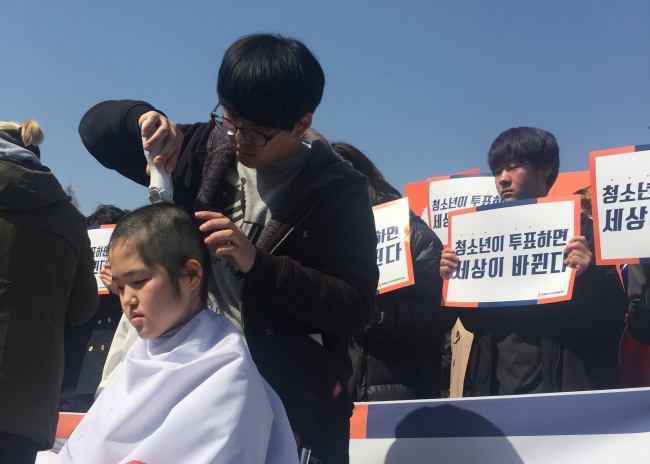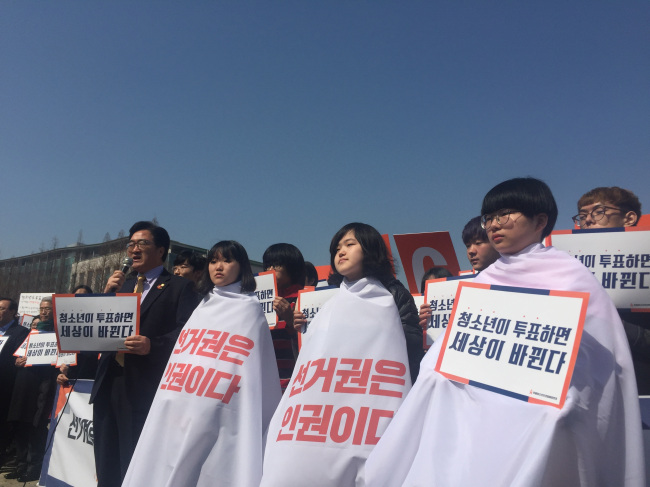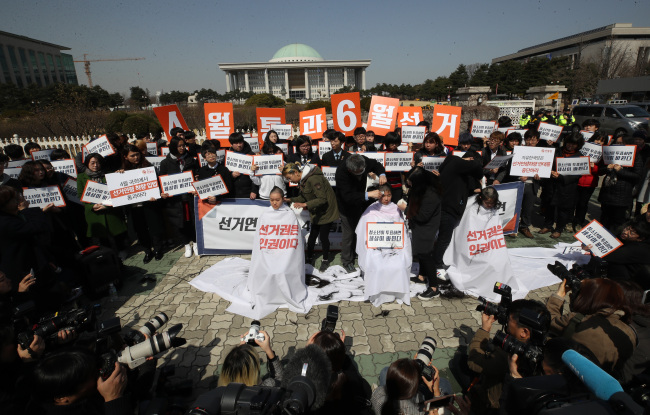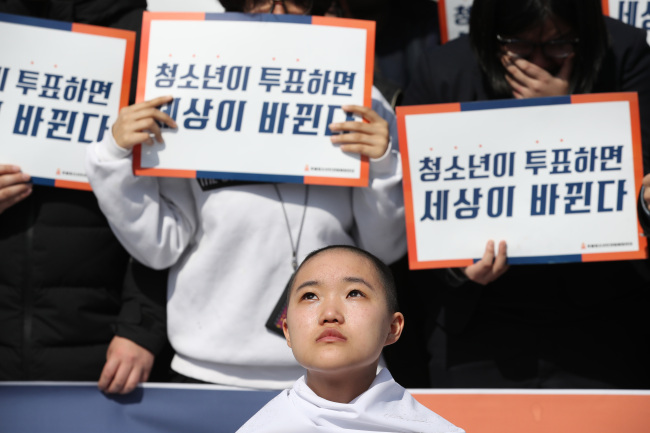In front of the main gate of the National Assembly on Thursday morning, Kim Yoon-song had her head shaved bald. The 15-year-old was wearing what looked like a white hairdressing gown; written across it was “Suffrage is human rights.” Tears rolled down her face as the last bits of her hair fell to the ground.
“I’ve been slapped on my face or got my hair pulled so many times at home for simply talking back to elders and expressing my opinions, only because I was a ‘teenager,’” Kim told The Korea Herald. “Having the right to vote is to have the right to speak. It means to have the right to live as a human being.”
Kim is one of three South Korean teenagers who publicly had their heads shaved Thursday as a way to protest the nation’s current voting age, which is set at 19. She has been fighting for this cause for at least a year, and says she left her home and school after suffering violence. Among the things Kim was physically punished for were not finishing her milk in 50 seconds in class.
 |
| Teenager Kim Jeong-min (left) gets her head shaved bald in protest against the current voting age that only allows those 19 or older to cast ballots. (Claire Lee/The Korea Herald) |
“For me, personally, this issue of voting age is directly linked to the issue of violence which I’m experiencing as a minor almost every day,” she said.
South Korea is currently the only country among the Organization for Economic Cooperation and Development where the voting age is 19. The same day Kim and her colleagues shaved their heads, the presidential office proposed the legal voting age be lowered to 18. The constitutional amendment needs approval from two-thirds of lawmakers at the parliament to be put to a national referendum, once it is submitted Monday.
“I appreciate President Moon Jae-in’s willingness to lower the voting age,” Kang Min-jin, a youth rights activist, told The Korea Herald. “But we are aware that the Constitution does not get revised easily. Ultimately, we think the legal voting age should be lowered down to 16, not 18.”
Whether the proposal will be approved is unclear at this stage, as the conservative main opposition Liberty Korea Party has been mostly against the notion. The party has said it is “concerned” about the “politicization of schools,” suggesting the first and foremost responsibility of teenage students is to focus on academics.
 |
| From left: Ruling Democratic Party floor leader Woo Won-sik and teenage protesters Kwon Li-mo, Kim Jeong-min and Kim Yoon-song speak at a press conference demanding the National Assembly pass a bill on lowering the voting age to 18. (Claire Lee/ The Korea Herald) |
 |
| Three teeange protesters have their heads shaved bald in front of the National Assembly building in western Seoul, Thursday.(Yonhap) |
Yet some point out that not all 18-year-olds in South Korea are in school. Also at age 18, South Koreans are legally entitled to marry and work for the government, but are not able to vote.
“The fact that this country’s 18-year-olds can work for the National Election Commission, but are not allowed to vote, is ridiculous,” said Roh Hoe-chan, the floor leader of the left-wing Justice Party.
“We owe justice to so many teenagers who have fought for democracy throughout our modern history. Nine out of 12 protesters who sacrificed their lives during the pro-democracy movement in Masan in 1960 were high school students.”
Studies show that South Korean teenagers are not uninterested in politics. Research by a local youth rights group, which surveyed some 2,420 teenagers nationwide last year, revealed that almost 50 percent of all participants said they attended the candlelight vigils denouncing former President Park Geun-hye’s corruption scandal and calling for her resignation in 2016.
Almost 85 percent of participants said they are willing to be more engaged in the nation’s political and social affairs once their right to vote is guaranteed by the Constitution.
“I’ve been told by many adults that teenagers in this country only demand for their rights, while not fulfilling their duties (as students),” said Kwon. “But we are not asking for special treatment. We are entitled to have this right (to vote).”
Youth activists say the nation’s current voting age — and the exclusion of teenagers from politics — is intertwined with the harsh and hypercompetitive environment teenagers here are often forced to endure. South Korean youth suffer the highest suicide rate in the world among OECD countries.
 |
| Teenage protester Kim Yoon-song. (Yonhap) |
The study by the youth rights group showed that 35.3 percent of all teenage participants said they have often experienced physical punishment from teachers at school. At the same time, 40 percent said they have been verbally abused by a teacher at least once.
Almost 35 percent said they think Korean society “severely ignores, abuses and discriminates against” minors.
The statistics are very much reflected in the life of Kwon. She said she has been physically abused by teachers “countless times” since elementary school. She also said she was constantly exposed to discriminatory and insensitive remarks from teachers in her classes.
Among the things she heard was, “Girls need to be diligent because they need to perform domestic chores well once they grow up,” and “If you engage in homosexual relationships, you’ll get AIDS.”
Kwon, alongside other activists, said lowering the voting age will bring changes to the country’s next generation, and ultimately, its future.
“Once we get our right to vote, violence against minors will be eradicated by minors,” Kwon said. “Our opinions on our own lives — at home, school and society — will finally matter to the authorities.”
By Claire Lee (dyc@heraldcorp.com)

